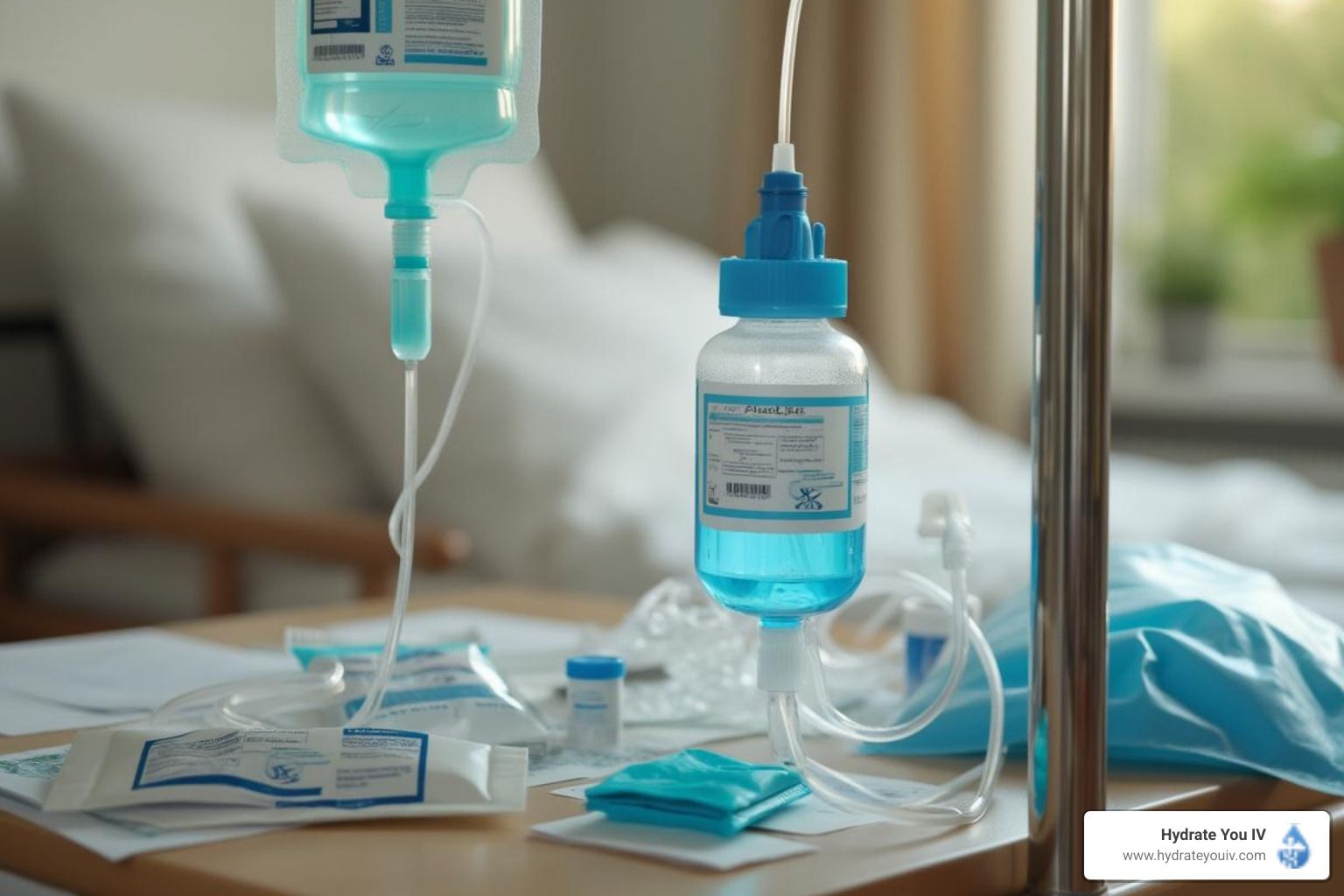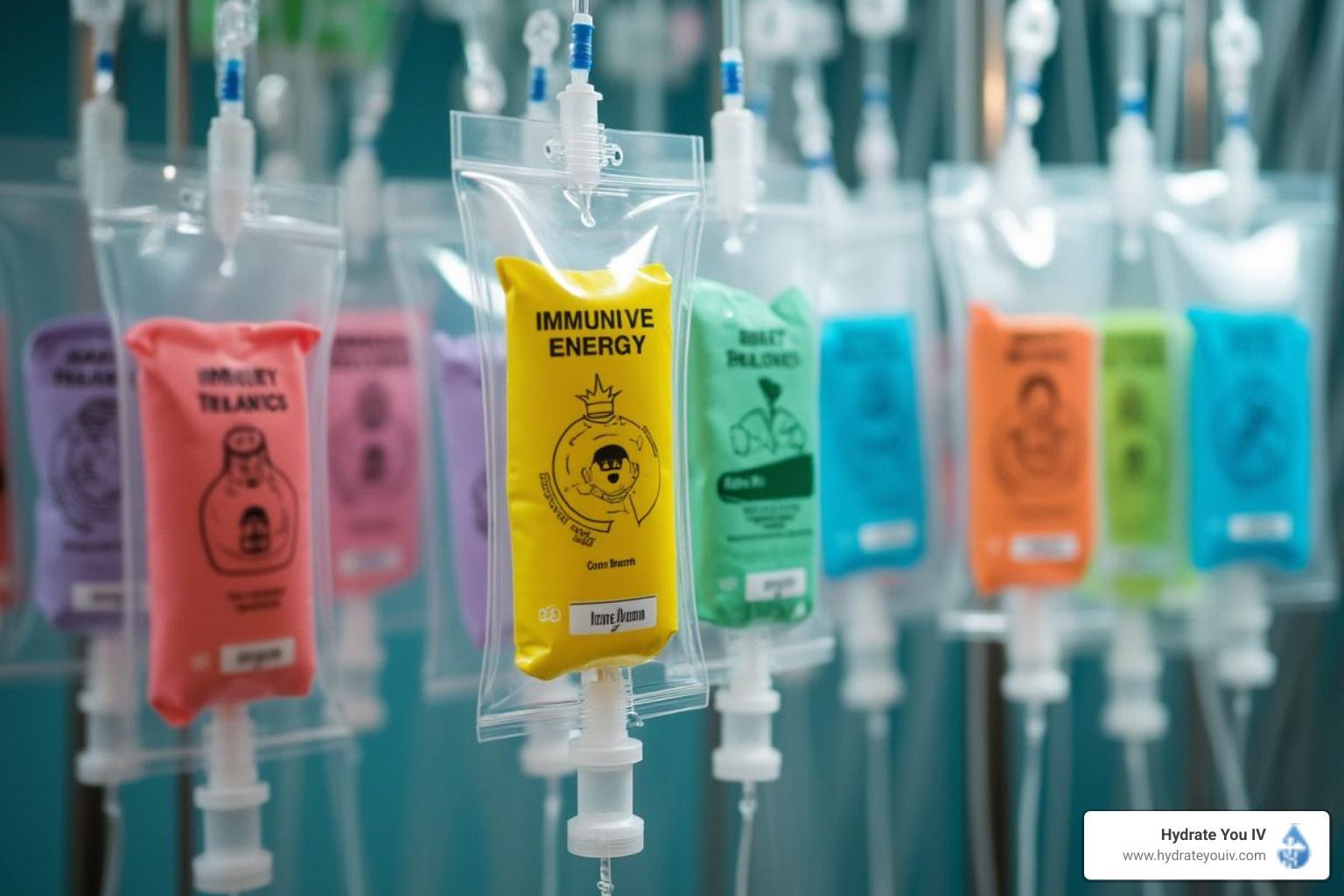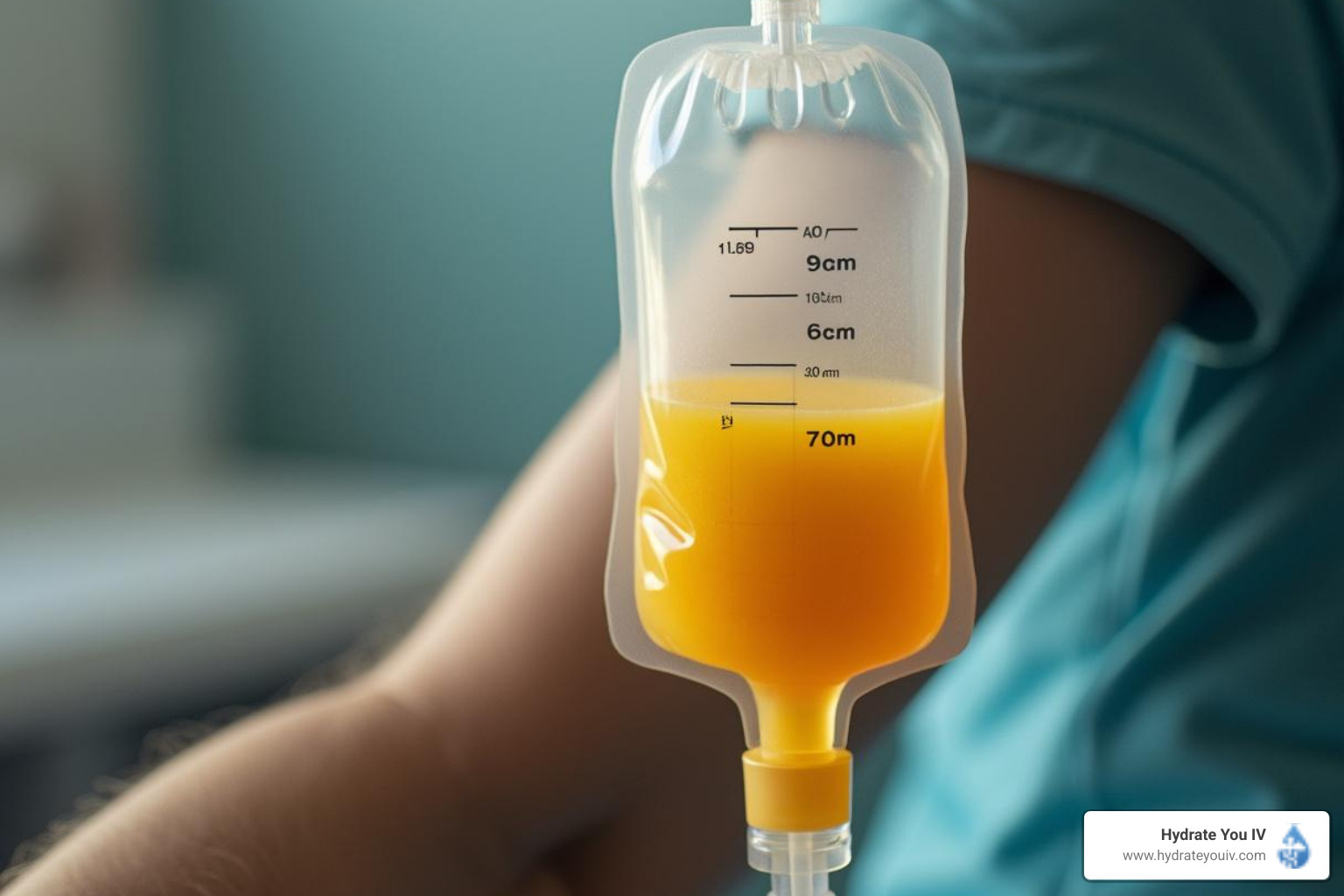How Long Do IV Vitamins Stay in Your System?
IV vitamin therapy has become a popular way to boost energy, hydration, and immunity but one question nearly everyone asks is, how long do IV vitamins stay in your system? Unlike oral supplements that pass through the digestive tract, IV vitamins enter the bloodstream directly, allowing your body to use them almost immediately. But that doesn’t mean they all stay in your system for the same amount of time. Some nutrients, like vitamin C and magnesium, are filtered out within hours, while others, such as vitamin B12, can remain in the body for days or even be stored for months.
Understanding how long these vitamins last helps you know what to expect after an infusion, how long the benefits may last, when your body starts to clear them, and why some people feel results longer than others. For simple, personalized guidance on timing and add-ins, Hydrate You IV builds a plan around your needs
What “Stay in Your System” Actually Means
When people ask “how long do IV vitamins stay in your system?” they’re usually talking about more than just time in the bloodstream; they’re also asking how long the body keeps using or feeling the benefits. Because IV delivery bypasses digestion, levels rise quickly and your body decides what to do next. In practice, that means the same infusion can follow a few predictable paths:
- Immediate use: cells pull in what they need for energy, immunity, and recovery.
- Short-term storage: some nutrients leave the blood and settle into tissues for later use.
- Natural clearance: any true excess is filtered out as part of normal physiology.
A key concept here is the difference between blood half-life and tissue storage. Half-life describes how fast a nutrient’s blood level drops often within hours for many water-soluble vitamins. That decline doesn’t equal “gone.” Nutrients can shift from circulation into muscles, nerves, or the liver, where they remain available beyond the blood window. A classic example is vitamin B12, which may pass through the bloodstream relatively quickly yet persist in liver stores for far longer, supporting normal function between doses.
This also explains why effects can outlast blood levels. Once cells absorb nutrients, they keep using them to rebalance systems, think mitochondrial energy, antioxidant defense, and fluid balance. It’s common to feel clearer, steadier, or better hydrated for a day or more after an infusion because the impact window reflects cellular activity, not just what’s measurable in the blood at a single moment.
How Long Popular IV Nutrients Last (By Ingredient)
Vitamin C
Once delivered through an IV, vitamin C enters the bloodstream within minutes and reaches its peak concentration quickly. However, the body also clears it quite fast. Most of the vitamin C circulating in the bloodstream has a half-life of about 2–3 hours, and a large portion is filtered out through the kidneys within 24 hours, especially if your levels were already normal.
That said, the experience can differ depending on your baseline status.
You may feel better for longer if your body was deficient or fighting stress or illness. In those cases:
- Vitamin C is absorbed by immune cells and tissues.
- It supports collagen formation, antioxidant activity, and recovery.
- Even when blood levels drop, cells keep using what they've stored.
So, while vitamin C itself doesn’t stay long in the bloodstream, the benefits can last a day or two.
B-Complex (B1, B2, B3, B5, B6)
B vitamins are all water-soluble, which means they don’t stay in your bloodstream for long. After infusion, they circulate quickly, support metabolism, nerve function, and energy production, and then excess amounts are flushed out through urine, often within several hours to about a day.
Unlike B12, most B vitamins are not stored in large amounts, so their effect is more short-term. Some people notice increased energy, sharper thinking, or better mood for 24–48 hours, especially if they were depleted before the infusion. Once your body uses what it needs, the rest is naturally excreted.
Vitamin B12
Vitamin B12 behaves very differently from other B vitamins. After an IV infusion, it enters the bloodstream and remains there for several days, with a plasma half-life estimated at around 6 days. But the real advantage of B12 is its storage ability; the body can keep it in the liver, muscles, and other tissues for weeks to months.
This is why people who get B12 infusions often don’t need them as frequently as other vitamins. It also explains why B12 deficiency symptoms (like fatigue, brain fog, numbness, or mood changes) can take time to return once levels are restored.
Magnesium
Magnesium levels in the blood rise soon after an IV infusion and typically remain elevated for about 3–5 hours before the kidneys begin clearing the excess. However, this doesn’t tell the full story. Magnesium also moves into muscle tissue, nerves, and bones, where it continues to support relaxation, muscle recovery, sleep quality, and nerve signaling.
If someone was magnesium-deficient before the infusion, they may feel benefits, like reduced muscle tension, calmer nerves, or better sleep, for a full day or more, even though blood levels have already returned to normal.
Glutathione
Glutathione has one of the shortest blood lifespans of all IV nutrients. After infusion, it may stay in the bloodstream for only 10–15 minutes before it's broken down or taken up by cells. But this doesn’t make it ineffective; in fact, its power comes from what happens inside the cells.
Glutathione supports your body by:
- Neutralizing free radicals and oxidative stress
- Recycling other antioxidants like vitamin C and E
- Supporting liver detoxification
Even though its blood presence is brief, the cellular antioxidant effects can last several hours to a full day, especially in people with stress, inflammation, or toxin exposure.
Fluids (The Carrier)
The saline or fluid used to deliver IV nutrients is processed quickly. In a healthy person, most of the fluid is absorbed into tissues or filtered by the kidneys within a few hours. You may feel hydrated, less fatigued, or relieved of headaches during this time.
However, the fluids don’t determine how long the vitamins last; they simply help deliver them efficiently. The vitamins and minerals themselves follow their own timeline once inside the body.
Factors That Change How Long IV Vitamins Stay in Your System
- Baseline Nutrient Levels (Deficient vs. Normal)
If your body is already low on vitamins or minerals, it absorbs and stores more of what it receives, making the effects last longer than in someone with normal levels. - Kidney and Liver Function + Hydration
These organs control how quickly vitamins are filtered out; proper hydration speeds delivery but also elimination, while dehydration or reduced organ function slows clearance. - Dose, Add-Ins, and Formulation Type
Higher doses or combinations like Vitamin C + Glutathione or B12 + MIC injections may extend how long nutrients remain active compared to small, basic drips. - Metabolism, Age, and Body Composition
Faster metabolisms and younger individuals tend to process vitamins quicker; older adults or those with more body fat may retain some nutrients, especially B12 or fat-soluble types, longer. - Frequency of IV Infusions and Overall Diet
Regular IV sessions or a nutrient-rich diet help maintain vitamin stores and prolong effects, while a poor diet or long gaps between sessions cause levels to drop sooner. - Lifestyle, Stress Levels, and Illness
High stress, intense workouts, travel, or illness can make your body use up vitamins faster for repair, immunity, or energy reducing how long they stay in your system.
How Hydrate You IV Helps You Safely Plan and Personalize Your IV Vitamin Routine

How often you should get IV vitamins depends on your goal and your current levels. Some people only need a drip for a specific moment (travel, hard training week, illness recovery). Others benefit from a longer plan when repleting low B12, rebuilding after stress, or supporting poor absorption. Hydrate You IV keeps this simple: a short intake, a quick review of your history/meds, and a plan that fits you, not a one-size-fits-all schedule.
A simple way to decide when to book:
- Event boost (as needed): pre-travel, post-illness, hangover, big training block, heavy work stretch.
- Repletion plan (scheduled): low B12 or recurring fatigue → set a cadence (weekly/bi-weekly/monthly) and adjust based on how you feel and any labs.
- Maintenance (periodic): once you’re steady, space sessions out and use add-ins only when helpful.
During each visit, licensed clinicians place the IV, monitor your vitals, and tailor the bag (e.g., Myers’ base with B-complex + vitamin C; optional B12, magnesium, or glutathione). You’ll likely feel a brief pinch, then a cool sensation as fluids start, and many people notice clearer focus or better hydration the same day.
What to expect (most people):
- Mild, temporary effects like slight bruising at the site or a warm/metallic taste with some vitamins.
- Guidance on which add-ins suit your goal (e.g., magnesium for muscle recovery, B12 for energy, vitamin C for immune support).
- A simple aftercare reminder: hydrate, eat normally, and note how you feel for timing the next session.
Bottom line: Hydrate You IV pairs rapid screening with expert dosing and a plan aligned to your goals, so you know exactly when to drip, what to include, and how often. To schedule, simply book us online for our services.











